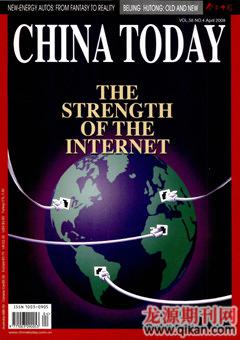Charity Online
By staff reporter LI YAHONG

MAO Lihui, a teacher in a remote mountainous area, changed his deprived students lives with the help of the Internet. The article he wrote on his blog, which included pictures of his pupils in their tattered clothes and often bare feet, aroused public sympathy and prompted an influx of donations.
Charity via the Internet is catching on among the common people. More and more netizens now express compassion through this brand-new channel for public relief, according to Liu Guolin, secretary general of China Charity Federation – the countrys biggest charitable organization.
A Vast Platform
Mao Lihui works at a primary school in Huangjing Village, in one of the poorest areas of Yunnan Province. He is one of two teachers of the schools 32 pupils. As there is no Internet access in the village, Mao walks an hour and half to county town to get online.
Most of the residents in Huangjing Village are farmers who subsist on an average annual per capita net income of just RMB 604, according to the local government website. As their parents cannot afford to buy them warm winter garments, the children wear the same unlined clothes all year round. In his article Mao Lihui so describes his pupils: “They stand in the muddy playground, Li Defeng in the pair of rubber sandals he has worn all winter long. I can see Chen Gongmins feet are blue with cold because he isnt wearing socks and the heels on his shoes are missing. Fang Kaimings shoes are far too big for him but, as he told me, ‘Ill grow into them.”
“I just want people to help these poor children,” Mao Lihui concluded. Within two days, his article had scored more than 150,000 hits. Many netizens left message expressing concerns. A young woman called Mao Lihui on the phone, saying: “I dont have any children, but Im buying new clothes and sending them to your pupils.”
Just three days later, Mao Lihui received the first netizen consignment of 33 pairs of socks and shoes. His pupils have since received more than 7,000 parcels of clothes,from cities both within China and overseas.
The Internet provides an open, broad platform of networks that link lives and offer convenient channels for good works. When the May 12 earthquake destroyed local telecommunications and transport in Sichuan, the web saved 3,000 lives. The note a netizen posted on the www.baidu.com(Chinas best known search engine) BBS on May 17 2008, saying that he was a teacher at a village middle school near the epicenter where students and teachers buried in debris desperately needed water, food and medicine, was soon reported to the local government, who speedily provided disaster relief.
During the course of rebuilding work in the earthquake-hit area, Chinas websites worked together with charitable organizations such as the Red Cross Society of China and the China Charity Federation. Donations received on the www.tencent.comonline donation platform, for example, hit RMB 1.5 million in just one hour and reached a peak of RMB 150,000 per minute. Better known charitable organizations also became involved in online endowments.
In the past, people willing to donate to worthy causes were put off by imperfect endowment systems. But this changed in 2007, when the China Charity Federation established the www.usnow.org professional online donation platform. As Liu Guolin said, “It initiated a convenient channel for Chinese philanthropy.”
Coexistent Defects
More people and entities organize charitable activities through the Internet, and many websites employ new methods like online donation and auctions to help those in need.
But the Law on Donations for Public Welfare Undertakings rules that only public organizations may receive endowments. Bearing in mind the ways in which they came into being, online charitable activities organized by netizens and websites are less reliable than the more conventional charitable organizations.
The problem is that it is too easy for swindlers to take advantage of the comparatively casual organization of virtual, online charities. This was apparent after the 2004 Tsunami, when fake websites defrauded public donations worth millions.
As researcher Min Dahong of the Chinese Academy of Social Sciences commented: “These obvious inconsistencies cause public distrust in web-administered charitable contributions.” Another instance was that in May 2007, when netizens donated a total RMB 150,000 to enable a girl to undergo surgery for a brain tumor. But after her treatment the girl kept the remaining RMB 100,000 instead of endowing it, as she originally promised, on others in similar need. Her actions caused a public outcry. “There is still a general absence of social relief, aid, and online charity legislation,” Pang Chenmin, deputy director of the disaster relief department under the Ministry of Civil Affairs, observed.
Appeals for social aid on the Internet are now commonplace. But as Min Dahong points out: “It is almost impossible for the common people to know whetherthese appeals are genuine. Only strict regulations can ensure reliable administration of online charities.”

